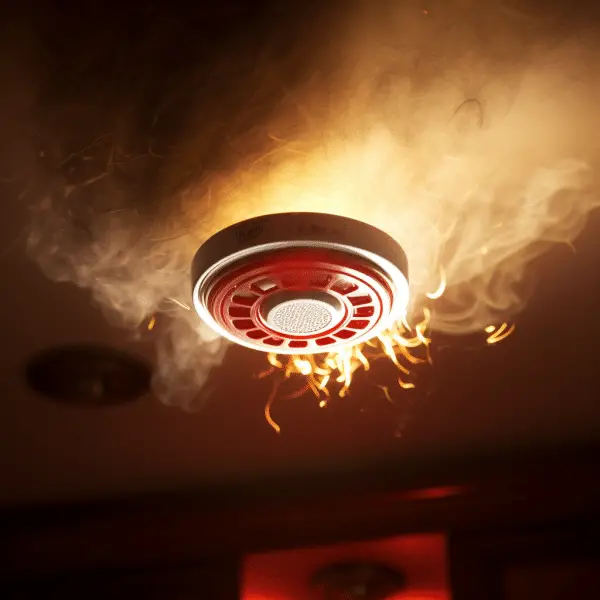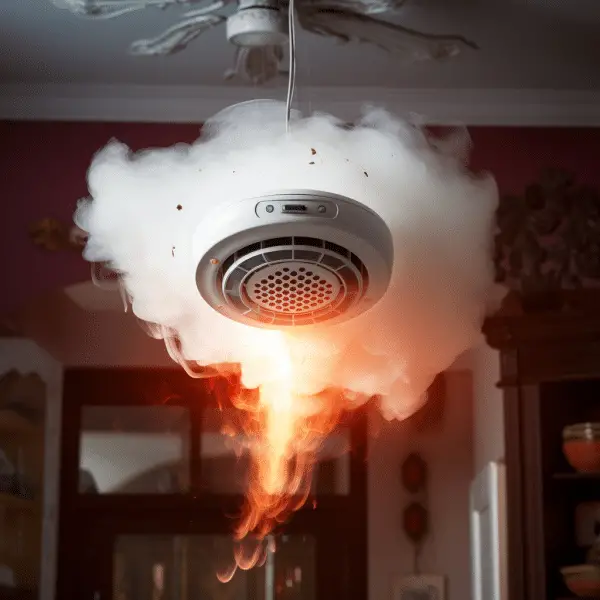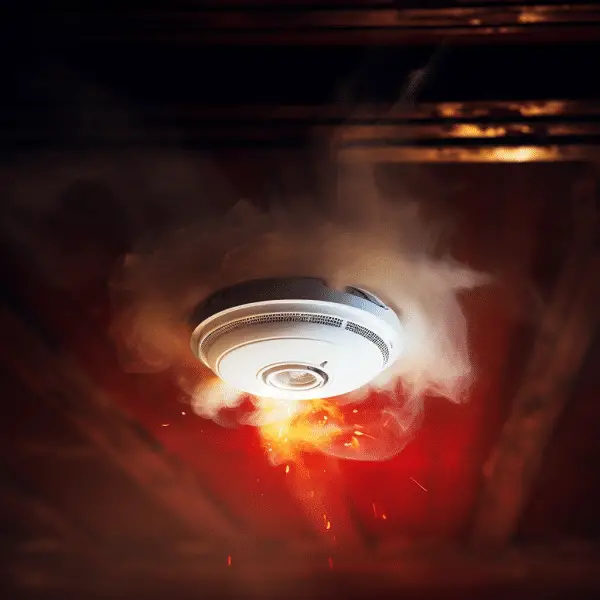Introduction
Why Smoke Detector Beeps After Changing Battery: Smoke detectors are an essential safety feature in every home, alerting occupants to the presence of smoke and potential fire hazards. These devices are designed to provide early warning and save lives, making them a crucial component of any household. However, it can be frustrating when a smoke detector starts beeping after changing the battery. This article aims to explore the reasons behind this common occurrence and provide insights into how to resolve the issue.
Firstly, it is important to understand that smoke detectors are designed to emit a beeping sound when there is a problem. This sound serves as a warning signal to indicate that the device is not functioning correctly or that there is a potential issue that needs attention. While it may be tempting to ignore or disable the beeping, it is crucial to address the problem promptly to ensure the continued safety of your home and its occupants.
The internal components
One of the most common reasons why a smoke detector beeps after changing the battery is due to improper installation or battery placement. It is essential to follow the manufacturer’s instructions carefully when replacing the battery to ensure it is inserted correctly. If the battery is not properly aligned or securely in place, the smoke detector may not receive the necessary power, resulting in the beeping sound. Therefore, it is crucial to double-check the battery installation and ensure it is snugly fitted.
Another possible reason for a smoke detector beeping after a battery change is a malfunctioning or expired device. Smoke detectors have a limited lifespan, typically ranging from 8 to 10 years. Over time, the internal components may wear out or become less sensitive, leading to false alarms or beeping sounds. If your smoke detector is older or has exceeded its recommended lifespan, it may be time to replace the entire unit to ensure optimal functionality and reliability.

How do I get my smoke detector to stop chirping after I change the battery?
Clear Residual Charge to Stop the Chirp
Remove the alarm from your ceiling or wall. Open the cover and take out the battery. Press and hold the test button for 15-30 seconds. This will fully reset the smoke alarm and drain any charge left inside.
If your smoke detector is chirping after you have changed the battery, there are a few possible reasons for this. It can be frustrating to hear the chirping sound constantly, but it is important to address the issue as soon as possible to ensure the safety of your home and family. In this article, we will discuss some common reasons why your smoke detector may be chirping after a battery change and how to resolve the issue.
One possible reason for the chirping sound is that the new battery you installed may be faulty or not fully charged. Even though you have replaced the battery, it is possible that it is not providing enough power to the smoke detector. To resolve this, try replacing the battery with a new one from a different batch or brand. Make sure to check the expiration date on the battery packaging to ensure it is not expired.
Another reason for the chirping sound could be that the smoke detector itself is malfunctioning. Over time, smoke detectors can become less reliable and may need to be replaced. If you have tried replacing the battery and the chirping continues, it may be time to replace the smoke detector altogether. It is recommended to replace smoke detectors every 10 years to ensure they are functioning properly.
Another electronic device
Additionally, dust or debris may have accumulated inside the smoke detector, causing it to chirp. Over time, dust can interfere with the sensor and trigger false alarms or chirping sounds. To fix this issue, you can try gently vacuuming or blowing out any dust or debris from the smoke detector. Make sure to turn off the power to the smoke detector before attempting to clean it.
In some cases, the chirping sound may not be coming from the smoke detector itself, but from a different device in close proximity. It is possible that another electronic device, such as a carbon monoxide detector or a security system, is causing the chirping sound. Try locating the source of the sound and ensure that all devices are functioning properly and have fresh batteries.
Why is my smoke alarm beeping with a new battery?
There are a few possible causes for your smoke alarm to keep chirping even with a new battery. It might be time to buy a new detector. Check the date of manufacture printed on the back of your alarm to confirm it’s not expired. Most alarms expire 7-10 years after the manufacture date.
There can be several reasons why your smoke alarm is beeping even with a new battery. It can be quite frustrating to replace the battery in your smoke alarm, only to have it start beeping again shortly after. However, understanding the possible causes of this issue can help you troubleshoot and resolve the problem.
Faulty battery installation may cause your smoke alarm to beep with a new battery. Smoke alarm batteries may not be correctly connected or inserted. Make sure the battery is securely installed and contacts the connections. A loose battery or poor connection can cause the smoke alarm to beep.
A low battery warning may also cause the buzzer. Even with a new battery, the smoke alarm may beep to indicate low battery. If your battery is old or undercharged, this can happen. Try a new battery from a reputable brand to stop the beeping.
The internal components of the smoke alarm
Additionally, the smoke alarm may be beeping due to a malfunction or defect. Smoke alarms have a limited lifespan, typically around 10 years. If your smoke alarm is older than this, it may be time to replace it. Over time, the internal components of the smoke alarm can wear out or become faulty, causing it to beep even with a new battery. Consider replacing the smoke alarm with a new one to ensure proper functionality.
Lastly, environmental factors can also cause the smoke alarm to beep. Dust, dirt, or insects can accumulate inside the smoke alarm, interfering with its sensors and causing false alarms. Regularly clean the smoke alarm by gently vacuuming or blowing out any debris. Additionally, avoid installing the smoke alarm in areas with high humidity or near sources of steam, as this can also trigger false alarms.
Can you silence a smoke detector from beeping?
Take the smoke detector off its mounting bracket on the ceiling and disconnect the power cable plugged to the smoke detector. Take out its battery, then press the “Test” button holding it down for 15 seconds. An alarm will sound for a short time, then the alarm will silence.
You can stop a smoke detector from beeping. Smoke detectors ring loudly to warn of fire hazards. This feature is essential for occupant safety, although it may be necessary to temporarily silence the alert. Silencing a smoke detector should only be done in certain situations and never permanently.
People often desire to hush a smoke detector when it goes off due to kitchen smoke or shower steam. Frequent false alarms can be frustrating and disruptive. The “”hush”” or “”quiet”” button on most smoke detectors can temporarily silence the alarm. This button is usually on the detector’s front or side and easy to reach.
Silencing the alarm for 10 minutes or less allows smoke or steam to disperse. After this, the alarm will reset and work again. Silencing the alert for too long may prevent a fire from being detected.
Triggered by a low battery
A low battery is another cause to mute a smoke detector. Most smoke detectors beep or chirp when the battery is low. This sound is irritating, especially at night. Here, replacing the battery immediately is advisable. The beeping should stop after installing the new battery.
To ensure smoke detectors work, test them often. Press the detector’s front or side test button to achieve this. If the alarm doesn’t sound when the test button is pressed, replace the detector immediately.
Why is my smoke alarm beeping but not replaceable battery?
Many smoke and heat alarms are now fitted with a sealed lithium battery, designed to last the life of the alarm. These batteries are not accessible for replacement and so if your alarm starts chirping but has a non-replaceable battery, the alarm may have reached the end of its life.
There can be several reasons why your smoke alarm is beeping even if you have already replaced the battery. It can be frustrating and confusing, but understanding the possible causes can help you troubleshoot the issue effectively. In this article, we will explore some of the common reasons why your smoke alarm may be beeping despite having a new battery.
One possible reason for your smoke alarm beeping with a new battery is that the battery may not be properly installed. Sometimes, the battery may not be making proper contact with the terminals in the smoke alarm, causing it to beep. Ensure that the battery is inserted correctly and securely, making sure it is aligned with the positive and negative terminals.
Another reason for the beeping could be a faulty smoke alarm. Smoke alarms have a limited lifespan, typically around 10 years. Over time, the internal components of the smoke alarm can wear out, leading to false alarms or beeping. If your smoke alarm is older than 10 years, it may be time to replace it with a new one.
Triggering false alarms
Additionally, dust or debris can accumulate inside the smoke alarm, causing it to beep. Over time, dust particles can interfere with the smoke alarm’s sensors, triggering false alarms. Regularly cleaning your smoke alarm by gently vacuuming or blowing out any dust can help prevent this issue.
Some smoke alarms have a feature called “”hush”” or “”silence”” that allows you to temporarily disable the alarm. If your smoke alarm is beeping, try pressing the hush button to see if it stops the beeping. This feature is designed to silence the alarm for a short period, usually around 10 minutes, before it automatically resets.
Will removing the battery stop the chirping?
The detector’s residual charge keeps the chirp going for at least seven days after the battery dies. After removing the battery, press the test button for 15 seconds to drain this residual charge and stop the device from chirping.
When a smoke alarm chirps, many remove the battery first. The constant noise, especially at night, is irritating. The purpose of the chirping and whether removing the battery will fix the problem must be understood.
Smoke alarms warn of fire hazards and save lives. Cchirping indicates a low battery and requires replacement. It reminds us to check the smoke alarm’s functionality and fire detection. Thus, removing the battery stops the chirping but disables the smoke alarm in an emergency.
Addressing the chirping issue is more important than momentarily silencing it. Changing the battery usually fixes the issue. If the chirping continues after replacing the battery, it may be a different issue. It could indicate a faulty smoke alarm that has to be changed or a house wiring issue.
A backup power source
ASmoke alarms usually feature a lithium battery as a backup power source to keep them running if the primary battery dies. This means that removing the battery may not completely stop the chirping, as the backup power source will still be active. In such cases, it is necessary to consult the user manual or contact the manufacturer for guidance on how to address the chirping issue.
While removing the battery will stop the chirping temporarily, it is not a recommended solution. It is essential to address the underlying issue causing the chirping and ensure that the smoke alarm is functioning properly to provide the necessary protection in case of a fire.”
The smoke detector itself is malfunctioning
There are various reasons a smoke detector may beep after a battery change. One possibility is that the new battery is not correctly placed or connected to the detector. The smoke detector battery must be properly inserted and secured.
Another possibility is a faulty smoke detector. Smoke detectors can wear out and need replacement. The smoke detector may need to be replaced if the beeping continues after changing the battery.
Some smoke detectors also automatically notify users of limited battery life. This function alerts customers to replace the battery before it dies. If the beeping continues after changing the battery, the smoke detector may be warning you to replace it soon.
To avoid beeping after changing a smoke detector battery, are there any special steps?
To avoid beeping after changing a smoke detector battery, perform these procedures. First, make sure the replacement smoke detector battery is the right size and kind. Use the manufacturer’s instructions or the detector’s label to choose a battery.
Press and hold the smoke detector test button for a few seconds before removing the old battery.This will discharge any remaining power and help prevent false alarms or beeping after the battery replacement. Additionally, it is crucial to handle the battery with care and avoid touching the metal contacts to prevent any interference with the detector’s functionality.
After installing the new battery, click the test button again to test the smoke detector. It will verify battery insertion and detector operation.If the detector still beeps after the battery change, review the manufacturer’s troubleshooting guide or contact customer service.
Should I use a certain battery brand to stop the smoke detector from ringing after replacement?
Using the right battery type and brand can prevent smoke detectors from beeping following battery replacement. Most smoke detectors utilize alkaline batteries, although trusted brands recommend high-quality, long-lasting batteries. Smoke detectors use “”long-life”” or “”heavy-duty”” batteries.
Use the proper battery type and brand to give the smoke detector a stable power source and reduce false alerts and blaring following battery replacement. Before installation, check the batteries’ expiration dates, as outdated batteries may not give enough power and cause the smoke detector to sound.
Are there any common mistakes people make while changing the battery in a smoke detector that could cause it to beep afterwards?
Yes, there are various frequent smoke detector battery replacement mistakes that might cause it to sound. Misinserted smoke detector batteries are common. The battery must be properly inserted with positive and negative terminals aligned. Unseated batteries may not contact the smoke detector, causing it to sound.
Use expired or low-quality batteries, another blunder. A dead or low-quality battery might cause a smoke detector to sound. Use a new, high-quality battery from a reputed source to avoid this issue.
How can one troubleshoot and resolve the issue of a smoke detector beeping after a battery change?
The battery should be properly fitted and in contact with the terminals. The detector may beep if the battery is loose or not properly fitted. Remove the battery and reinstall it carefully. If the detector beeps after the battery is properly fitted, it may have leftover power.
If the above steps do not resolve the issue, it is possible that the smoke detector itself is faulty or nearing the end of its lifespan. Smoke detectors typically have a lifespan of 8-10 years, after which they may start to malfunction. We propose replacing the smoke detector in such circumstances to ensure good operation and safety.

Conclusion
Smoke detectors often beep after battery replacement. This can startle and confuse homeowners, who may think the new battery or smoke detector is defective. There are various reasons a smoke detector may sound after a battery change, and recognizing them can help homeowners fix the problem and keep their house safe.
A smoke alarm blaring detector may be checking its performance following a. Many smoke detectors contain a self-test capability that analyzes sensors and circuitry to guarantee proper operation. Beeps indicate this self-test following a battery change or power interruption. Residents should check their smoke detector’s user manual to see if this is true and how long the self-test will persist.
Smoke detector
An improperly placed fresh battery might also cause a smoke detector to beep. You must insert the battery with the positive and negative terminals aligned. The smoke detector may beep if the battery is incorrectly installed. Sometimes double-checking the battery installation fixes this.
Occasionally, a smoke detector may beep after a battery change owing to a device flaw. After checking the battery and self-test, the smoke detector may need to be replaced if the beeping continues. For help diagnosing and fixing the problem, consult the manufacturer or a skilled technician.

